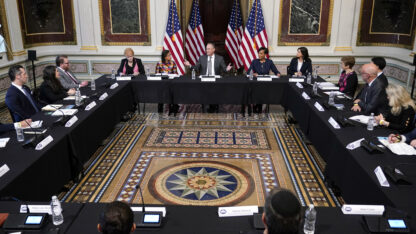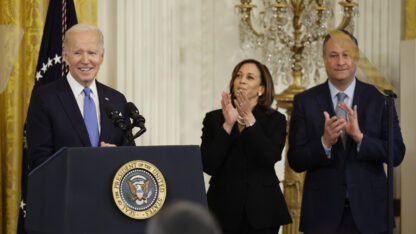As attendance dips, churches change to stay relevant for a new wave of worshippers

It’s Sunday morning and a small group sits around a fire pit in a community garden under the limbs of an expansive box elder tree. Church is about to start. And it’s cold.
“God our Father, we are just so thankful for this time that we have to share this morning,” says Pastor Chris Battle, a big man with a pipe clenched in his generous smile. “And we really thank you for fire that keeps us warm even as we sit up under this tree. We just pray that you would bless our time together.”
Three years ago, Battle walked away from more than three decades leading Black Baptist churches and turned his attention to Battlefield Farm & Gardens in Knoxville. They grow vegetables and sell them at a farmer’s market. They also collect unsold produce from around the city and deliver it to people in public housing once a week.
Battle says he left because traditional church was not connecting with people. He felt they were turned off by the sermons, the pitches for money, the Sunday-morning formality of it all.
“So I said to myself, maybe we need to begin to do church differently. But what does that look like? And I didn’t know until I got to the garden.”
American Christianity is in the midst of an identity crisis. Attendance is in steep decline, especially among millennials and Gen Z who say traditional church doesn’t speak to their realities.
In response, religious leaders are scrambling to experiment with new ways to offer meaning in peoples’ lives. Most of the folks who show up at Battlefield Gardens on Sunday mornings say they’re looking for a faith community, but they’re burned out on traditional religion.
“Generally, I’m here because I want two things out of church,” says Kelly Sauskojus, a 27-year-old PhD candidate in English who says she’s a refugee from fundamentalist churches.
“I want time to sit down, like we do on Sundays sometimes or around the fire, and, like, pray and re-center and figure out what we’re about in the world. Because the world is very noisy. And then I want a church to get s*** done with your community and for your community.”
Typically, Battle delivers a brief sermon on the teachings of Jesus. They talk about it. Then, instead of altar calls or holy communion, his congregation — such as it is — tends to the 50 raised beds of kale and eggplant, string beans and squash, tomatoes and greens, the chicken coop and the compost pile.
“People, when they come to the garden, they’ll have conversations with you,” Battle says. “But you tell ’em you’re a pastor, the conversation changes. They hide their liquor. They quit cussin’. I mean, everything changes.”
He guffaws. “But you tell ’em you’re a farmer and they start tellin’ you what color their thumb is. And I’m like, wow. Developing relationships with people in the garden. And it’s not happenin’ in the church. People are running away from the church.”
Indeed they are.
Last year, Americans’ membership in houses of worship fell below 50 percent for the first time since Gallup started its authoritative religion survey. In 1937 — the year the Gallup poll began — seven out of 10 Americans attended church. In 2020 — before the pandemic — only 47 percent of Americans belonged to a church, synagogue or mosque, according to the survey. It’s been trending downward since 2000. Young people are rejecting organized religion and some churches are facing an existential crisis.
Battlefield Farm offers a different kind of spiritual community: people can show up for Bible lessons, or they can simply dig in the dirt.
“We’re trying to create this community that people can learn to love each other, and ultimately love the world and transform it. Through collard greens and okra!” he says with another hearty laugh.
This impulse — this urgency — to try something new is being felt throughout the Christian church. Once-booming evangelical churches are worried about declining numbers. But liberal mainline protestants like the Lutherans, Methodists, Presbyterians, and Episcopalians are hemorrhaging members.
Consider Knoxville’s Marble City United Methodist Church. The stained-glass windows are still there, but today the structure houses an architectural firm and a Golden Roast coffee shop.
The house of worship closed a couple years ago because people stopped coming and tithing. Now they’ve returned, this time to the altar of caffeine.
“Every year we close anywhere between two and five churches. Every single year,” says Methodist pastor Bradley Hyde, sitting at a table sipping java while the milk steamer hisses behind the counter. “I think people were already wanting to leave church, and Covid gave them a great opportunity to say, ‘Goodbye.’ I’m not the only pastor who has noticed that, but a lot of people have just not come back.”
Hyde is in his 25th year in the ministry and sits on the Methodists’ regional Holston Conference in East Tennessee.
Hyde says he did focus groups among his parishioners and heard the same thing over and over: the church needs to do a better job of connecting with the community. So now the church he pastors, Bearden United Methodist, in addition to regular services, does its version of Battlefield’s okra and collards ministry. They collect unsold produce from local vendors and then, once a month, bring it back to the church parking lot.
“And our community is finally getting the word that we offer high-quality produce that they can come and get for no cost,” Hyde says. “And it has been a game-changer for connecting with our community.”
Yet while religious leaders watch their congregations dwindle, people still yearn for spirituality.
“Just because you leave organized religion doesn’t mean the hunger to connect with the divine is going to cease,” says the Rev. Caroline Vogel. She’s associate rector and director of Spiritus Knox, a center for spiritual learning and practice, at the Episcopal Church of the Ascension in Knoxville.
“It’s how we were created. We need food, we need shelter, we need clothing, and we also have to feed our souls in some way,” she continues. “And so I think there’s this challenge of, OK, we’ve been doing it like this for so long, and it’s just not working for people in a way that meets them in a holistic way.”
Ascension’s answer to this conundrum is to set aside Sunday evenings for non-churchy programs, such as Breathing Under Stained Glass. About 30 people sit on yoga mats on the terra cotta floor in the stately, hushed sanctuary that is softly illuminated by candles under the stained-glass saints.
“Hah! … Hah! … Hah!” they bellow in one of the breathing practices. Vogel and the rector, the Rev. Billy Daniel, lead the exercises sitting on pillows at the front of the church.
“Your human breath is infinitely connecting to the divine breath,” Vogel says in soothing tones, “so that as you breathe you are being breathed by the Holy.”
On other Sunday nights, the church offers a Celtic service, a book group and something called Tools of Aliveness. Most of the folks who show up don’t attend regular church.
“I was raised independent Baptist, where you can’t even wear pants in church, so laying on a yoga mat on the floor was a little weird. But wonderful,” says Jamie Hampton, a 44-year-old Tennessee state employee.
She says she and her husband stopped going to traditional church about six years ago because it wasn’t doing anything for them.
“The breathing linked with feeling the spirit is really important to me. And it stays with me more than just a sermon and some hymns.”
Back at the firepit at Battlefield Garden, Baptist Pastor Chris Battle says he used to measure the success of a church by what he calls “the BPs.”
“Butts in pews, bucks in the plate, baptisms in the pool, and building programs. The BPs. That’s how you grow a church, right?” he says, chuckling.
When he was senior pastor, the question used to be how can the church change the culture? Today, he says, it’s how do we change the culture of the church?
9(MDAxODM0MDY4MDEyMTY4NDA3MzI3YjkzMw004))








